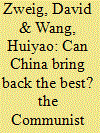| Srl | Item |
| 1 |
ID:
124642


|
|
|
|
|
| Publication |
2013.
|
| Summary/Abstract |
For some developing countries, the international flow of their human talent in the recent decade was more of a "reverse brain gain" than a "brain drain." China, too, joined the group of states whose students, after studying abroad, now found sufficient opportunity and an acceptable quality of life back home to make returning after graduation a reasonable option. Still, China had not succeeded in bringing back the very best scientists and academics. To remedy this problem, the Organization Department of the Chinese Communist Party became actively involved in the recruitment process. The key programme was the "1000 Talents" Plan, introduced in 2008 by Politburo member Li Yuanchao, who had a visionary perspective on reverse migration. This programme has succeeded in bringing back entrepreneurs full time; but it has not attracted the very best of the Chinese scientists and academics who studied and lived overseas to return fulltime.
|
|
|
|
|
|
|
|
|
|
|
|
|
|
|
|
| 2 |
ID:
104210


|
|
|
|
|
| Publication |
2011.
|
| Summary/Abstract |
Recent research on returning Chinese students has focused on their role as an alternative solution to their home country's mandate to build technological capacity. This study shows the depth of the 'brain circulation' that is underway and the fact that overseas students are not only serving China from abroad or by returning, but after they return they play a leading role in many aspects of China's 'going out' strategy. These returnee entrepreneurs present many advantages to the Chinese economy. They have studied at the best universities in the world, were deeply involved in the New Economy, and have gained valuable experience in listed companies overseas. They often possess venture capital, many have experience working with some of the best MNCs in the world, and they serve to contribute enormously to China's current economic engagement with the world. The paper describes the returnees' impact on China's globalization drive and analyzes the factors leading to their success in comparison to MNCs and indigenous Chinese firms.
|
|
|
|
|
|
|
|
|
|
|
|
|
|
|
|